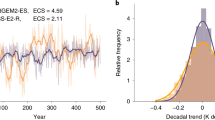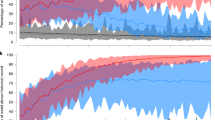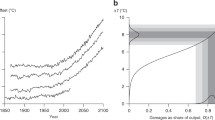Abstract
Arising from C. Mora et al. Nature 502, 183–187 (2013)
The question of when the signal of climate change will emerge from the background noise of climate variability—the ‘time of emergence’—is potentially important for adaptation planning. Mora et al.1 presented precise projections of the time of emergence of unprecedented regional climates. However, their methodology produces artificially early dates at which specific regions will permanently experience unprecedented climates and artificially low uncertainty in those dates everywhere. This overconfidence could impair the effectiveness of climate risk management decisions2. There is a Reply to this Brief Communication Arising by Mora, C. et al. Nature 511, http://dx.doi.org/10.1038/nature13524 (2014).
This is a preview of subscription content, access via your institution
Access options
Subscribe to this journal
Receive 51 print issues and online access
$199.00 per year
only $3.90 per issue
Buy this article
- Purchase on Springer Link
- Instant access to full article PDF
Prices may be subject to local taxes which are calculated during checkout

Similar content being viewed by others
References
Mora, C. et al. The projected timing of climate departure from recent variability. Nature 502, 183–187 (2013)
Lempert, R., Nakicenovic, N., Sarewitz, D. & Schlesinger, M. Characterizing climate-change uncertainties for decision-makers. Clim. Change 65, 1–9 (2004)
Mahlstein, I., Knutti, R., Solomon, S. & Portmann, R. W. Early onset of significant local warming in low latitude countries. Environ. Res. Lett. 6, 034009 (2011)
Hawkins, E. & Sutton, R. Time of emergence of climate signals. Geophys. Res. Lett. 39, L01702 (2012)
Deser, C., Knutti, R., Solomon, S. & Phillips, A. S. Communication of the role of natural variability in future North American climate. Nature Clim. Change 2 775–779 (2012) erratum 2, 888 (2012)
Diffenbaugh, N. S. & Scherer, M. Observational and model evidence of global emergence of permanent, unprecedented heat in the 20th and 21st centuries. Clim. Change 107, 615–624 (2011)
Knutti, R., Furrer, R., Tebaldi, C., Cermak, J. & Meehl, G. A. Challenges in combining projections from multiple climate models. J. Clim. 23, 2739–2758 (2010)
Nagele, P. Misuse of standard error of the mean (SEM) when reporting variability of a sample. A critical evaluation of four anaesthesia journals. Br. J. Anaesth. 90, 514–516 (2003)
Stocker, T. F. et al. (eds) Summary for policymakers. In Climate Change 2013: The Physical Science Basis. Contribution of Working Group 1 to the Fifth Assessment Report of the Intergovernmental Panel on Climate Change (Cambridge Univ. Press, 2013)
Ho, C. K., Hawkins, E., Shaffrey, L. & Underwood, F. M. Statistical decadal predictions for sea surface temperatures: a benchmark for dynamical GCM predictions. Clim. Dyn. 41, 917–935 (2013)
Anderson, B. T. Near-term increase in frequency of seasonal temperature extremes prior to the 2oC global warming target. Clim. Change 108, 581–589 (2011)
Mahlstein, I., Hegerl, G. & Solomon, S. Emerging local warming signals in observational data. Geophys. Res. Lett. 39, L21711 (2012)
Hegerl, G. C. et al. Detecting greenhouse-gas-induced climate change with an optimal fingerprint method. J. Clim. 9, 2281–2306 (1996)
Syktus, J. et al. Latitudinal dependence of signal-to-noise patterns from two general circulation models with CO2 forcing. Clim. Dyn. 13, 293–302 (1997)
Diffenbaugh, N. S. & Giorgi, F. Climate change hotspots in the CMIP5 global climate model ensemble. Clim. Change 114, 813–822 (2012)
Mahlstein, I., Daniel, J. S. & Solomon, S. Pace of shifts in climate regions increases with global temperature. Nature Clim. Change 3, 739–743 (2013)
Battisti, D. S. & Naylor, R. L. Historical warnings of future food insecurity with unprecedented seasonal heat. Science 323, 240–244 (2009)
Beaumont, L. J. et al. Impacts of climate change on the world's most exceptional ecoregions. Proc. Natl Acad. Sci. USA 108, 2306–2311 (2011)
Keller, K. M., Joos, F. & Raible, C. C. Time of emergence of trends in ocean biogeochemistry. Biogeosci. Discuss. 10, 18065–18092 (2013)
Jeffrey, S. et al. Australia's CMIP5 submission using the CSIRO-Mk3.6 model. Austr. Meteorol. Oceanogr. J. 63, 1–13 (2013)
Author information
Authors and Affiliations
Contributions
E.H. led the analysis and writing of the manuscript. B.A., N.D. and I.M. performed additional analyses, discussed the results and contributed text. All other authors contributed text.
Corresponding author
Ethics declarations
Competing interests
Competing Financial Interests Declared none.
PowerPoint slides
Rights and permissions
About this article
Cite this article
Hawkins, E., Anderson, B., Diffenbaugh, N. et al. Uncertainties in the timing of unprecedented climates. Nature 511, E3–E5 (2014). https://doi.org/10.1038/nature13523
Received:
Accepted:
Published:
Issue Date:
DOI: https://doi.org/10.1038/nature13523
This article is cited by
-
Anthropogenic influence in observed regional warming trends and the implied social time of emergence
Communications Earth & Environment (2021)
-
Phenological tracking of a seasonal climate window in a recovering tropical island bird species
Climatic Change (2021)
-
Human-induced changes to the global ocean water masses and their time of emergence
Nature Climate Change (2020)
-
Robust assessment of the time of emergence of precipitation change in West Africa
Scientific Reports (2020)
-
Emergence of unprecedented climate change in projected future precipitation
Scientific Reports (2020)
Comments
By submitting a comment you agree to abide by our Terms and Community Guidelines. If you find something abusive or that does not comply with our terms or guidelines please flag it as inappropriate.



